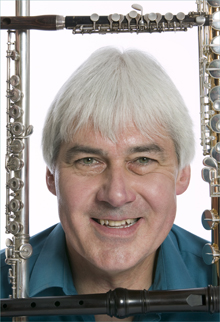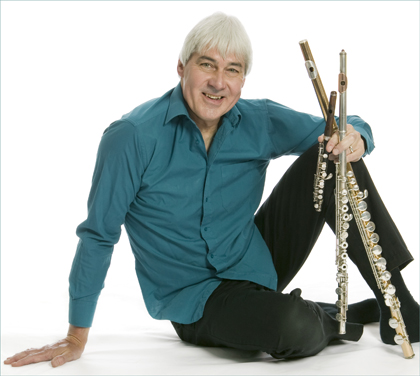|
Born in London in 1953 but now living in Oxford, Chris Britton's
flute-playing career has been very diverse, ranging from orchestral playing to
solo performances in such glorious settings as Christ Church in Oxford. His
early training (which also featured bassoon studies) was at the Royal College of
Music, London, for which he won a scholarship, then academic study at the
University of Birmingham (music and German), but majoring in performance in his
final year.
He has been a student in private lessons and masterclasses of such distinguished
flautists as James Galway, Susan Milan, Peter-Lukas Graf, Atarah Ben-Tovim,
Graham Mayger and Peter Lloyd. He freelanced with BBC orchestras, appearing as a
concerto soloist and broadcasting frequently on BBC Radio 3. He has played under
eminent conductors such as Rudolf Schwarz, Norman Del Mar, Richard Hickox and
George Hurst. More recently, alongside a busy and successful career as a flute
and recorder teacher, he has been active in diverse forms of chamber music: with
the Pavlova Wind Quintet, duos with the guitarist Raymond Burley and with the
percussionist Keith Fairbairn.
Recent concerts have featured him in events as extraordinary as appearing with
the Oxford Trobadors in performances of Occitan songs, in a prison with his wind
quintet, and improvising with the ex-Swingles Singer Wendy Nieper! He also
enjoys playing Latin-American songs with his trio Serendipity (flute, guitar and
percussion).

Chris has long been fascinated by the idea of re-arranging music from its
original format. Having grown up during the era of 'switched-on' Bach (Jacques
Loussier, Swingle Singers, Modern Jazz Quartet and others) he soon became aware
of the exciting possibilities of hearing early music presented in a new way.
Well-known precedents for this are Bach's re-arrangement of Vivaldi's string
concertos for harpsichord, and Mozart's re-working of Bach's preludes and fugues
for string quartet. Chris is currently working on arrangements of keyboard music
for his wind quintet. As a keen pianist and harpsichordist he has perhaps
greater access to unusual early and more recent compositions that a more
conventional wind-player may not be aware of. He is also about to record an album of
Bach pieces that he and Raymond Burley have arranged for flute and guitar.
Apart from arranging, Chris is concerned to give his instrument genuine solo
stature. The flute has long been recognised as an important orchestral
instrument, but it was only in the late 20th century that solo flute recitals
became the norm. Even so, flautists suffer the frustration that much of their
repertoire is second-rank compared to the great masterworks for piano or violin.
Having heard a performance of Bach's Chaconne for solo violin while at
university, which seemed to create an entire orchestra from 4 strings and one
player, he felt the flute could do something similar, especially the modern
Boehm-system flute with its extended range of notes and tone-colours. Bach
himself obviously thought highly of the flute and wrote much of its greatest
repertoire (solo sonatas, trio sonatas, obligatos in choral works, concertos),
no doubt inspired by the recent great improvements in the construction of the
instrument and the presence of virtuosos like Pierre-Gabriel Buffardin and
Johann Joachim Quantz. With that in mind, his approval of this album is not
impossible to imagine.
| |

![Counterpoint for One by Chris Britton [Counterpoint for One by Chris Britton]](http://he3.magnatune.com/music/Chris%20Britton/Counterpoint%20for%20One/cover_200.jpg)
Counterpoint for One
|

![[Magnatune : we are not evil]](http://he3.magnatune.com/images/m3/inside_magnatune_logo.gif)
![[Free trial: only $15 per month]](http://he3.magnatune.com/images/m3/inside_mascot.gif)
![[login]](http://he3.magnatune.com/images/m3/login_btn.gif)
![[info]](http://he3.magnatune.com/images/m3/info_btn.gif)












![[Magnatune : we are not evil]](http://he3.magnatune.com/images/m3/inside_magnatune_logo.gif)
![[Free trial: only $15 per month]](http://he3.magnatune.com/images/m3/inside_mascot.gif)
![[login]](http://he3.magnatune.com/images/m3/login_btn.gif)
![[info]](http://he3.magnatune.com/images/m3/info_btn.gif)










